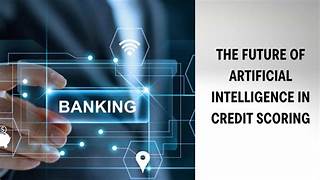Influence of Artificial Intelligence on Credit Scoring Systems
Credit scoring is a crucial aspect of the financial ecosystem, influencing how individuals and businesses access credit. Traditionally, credit scores were calculated using fixed algorithms that relied on historical data, such as payment history, outstanding debt, and length of credit history. While these methods provided a foundation for evaluating creditworthiness, they often lacked nuance and adaptability. With the advent of artificial intelligence (AI), the landscape of credit scoring systems has undergone a significant transformation.
AI’s integration into credit scoring has introduced dynamic, data-driven approaches that promise greater accuracy, inclusivity, and efficiency. This article explores how AI is influencing credit scoring systems, its benefits, potential challenges, and the implications for the financial industry and borrowers.
The Basics of Traditional Credit Scoring
Traditional credit scoring models, such as FICO or VantageScore, use a standardized formula to evaluate an individual’s credit risk. These models rely on data from credit reports provided by credit bureaus, focusing on five primary factors:
- Payment History: A record of timely or late payments.
- Credit Utilization: The percentage of credit limit used.
- Credit Age: The average age of credit accounts.
- Credit Mix: A combination of different types of credit accounts.
- New Credit: The frequency of new credit inquiries or accounts.
While these factors provide a general overview of creditworthiness, they fail to account for nuances like non-traditional financial behavior, alternative income sources, or changing economic conditions.
The Role of AI in Credit Scoring
AI introduces a more sophisticated approach to credit scoring by leveraging advanced algorithms, machine learning (ML), and vast amounts of data to analyze credit risk. Unlike traditional methods, AI-driven systems can process non-traditional data sources and adapt to patterns and trends in real time.
Key Contributions of AI to Credit Scoring Systems
- Enhanced Data Utilization
AI allows credit scoring models to go beyond conventional data sources. In addition to credit reports, AI systems can analyze:
- Bank transaction histories.
- Utility and rental payment records.
- Social media activity (in some jurisdictions).
- Behavioral patterns, such as online shopping habits.
This broader dataset provides a more holistic view of an individual’s financial behavior, particularly benefiting those with limited or no credit history.
- Improved Accuracy
Machine learning models can identify complex patterns in data, improving the precision of credit risk assessments. For instance, AI can detect subtle correlations between financial habits and the likelihood of loan repayment, leading to more accurate predictions. - Real-Time Decision-Making
Traditional credit scoring often involves delays in data updates and score adjustments. AI enables real-time credit assessments by continuously analyzing updated information, allowing lenders to make instant decisions on loan applications. - Personalized Scoring
AI-driven models can customize credit evaluations based on individual circumstances. For example, they can account for temporary financial setbacks, such as medical emergencies, without penalizing borrowers for long-term creditworthiness. - Inclusivity and Financial Inclusion
AI has the potential to bridge the gap for underbanked or unbanked populations who lack traditional credit histories. By incorporating alternative data, AI can provide credit access to individuals previously excluded from financial systems.
Applications of AI in Credit Scoring
1. Alternative Credit Scoring Platforms
Fintech companies like Upstart, Zest AI, and LenddoEFL have developed AI-powered credit scoring systems that rely on alternative data. These platforms use machine learning to assess creditworthiness for individuals with limited credit histories, expanding access to loans and financial services.
2. Dynamic Credit Monitoring
AI systems enable continuous credit monitoring, allowing lenders to adjust credit scores dynamically based on real-time data. This adaptability helps lenders manage risk more effectively and respond to changes in borrowers’ financial situations.
3. Fraud Detection
AI-powered credit scoring models can identify fraudulent activities by analyzing anomalies in data patterns. For instance, sudden changes in spending habits or inconsistencies in application information can trigger alerts, protecting both lenders and borrowers.
4. Risk-Based Pricing
AI facilitates more accurate risk-based pricing models, where interest rates and loan terms are tailored to individual risk profiles. This approach ensures fairer pricing for borrowers while helping lenders optimize profitability.
Benefits of AI-Driven Credit Scoring Systems
- Fairer Assessments
By considering a broader range of data, AI reduces biases inherent in traditional models, such as over-reliance on credit history length or penalizing younger borrowers. - Greater Efficiency
Automated AI systems streamline the credit evaluation process, reducing the time and resources required for manual assessments. - Increased Accessibility
AI-driven systems expand access to credit for marginalized groups, including low-income individuals and small businesses in underserved regions. - Scalability
AI models can handle vast amounts of data, making them scalable solutions for large financial institutions.
Challenges and Ethical Considerations
Despite its advantages, AI-driven credit scoring is not without challenges:
1. Data Privacy Concerns
The use of alternative data sources raises privacy concerns, especially when analyzing sensitive personal information like social media activity or online behavior. Ensuring compliance with data protection regulations, such as GDPR, is crucial.
2. Algorithmic Bias
AI models can inadvertently perpetuate biases if trained on biased data. For instance, historical disparities in lending practices can influence AI predictions, resulting in unfair treatment of certain demographics.
3. Lack of Transparency
AI models, particularly deep learning algorithms, often function as “black boxes,” making it difficult to understand how decisions are made. This lack of transparency can lead to challenges in explaining credit decisions to borrowers.
4. Regulatory Challenges
Governments and regulators must adapt to the complexities of AI-driven credit scoring, ensuring that these systems are fair, ethical, and compliant with existing laws.
5. Security Risks
AI systems are vulnerable to cyberattacks, including data breaches and model manipulation. Protecting sensitive borrower information is paramount to maintaining trust in these systems.
The Future of AI in Credit Scoring
The integration of AI into credit scoring is still evolving, with ongoing research and development aimed at addressing its limitations. Future advancements are likely to focus on:
- Explainable AI (XAI)
Developing models that provide clear and interpretable explanations for their decisions will enhance transparency and accountability. - Global Standardization
Establishing universal standards for AI-driven credit scoring systems can ensure consistency and fairness across regions and industries. - Enhanced Collaboration
Partnerships between financial institutions, fintech companies, and regulators will drive innovation while addressing ethical and regulatory challenges. - Integration with Blockchain
Combining AI with blockchain technology can create tamper-proof credit records, further enhancing security and transparency.
Conclusion
Artificial intelligence is redefining credit scoring systems by introducing data-driven, dynamic, and inclusive approaches to evaluating creditworthiness. While the technology offers numerous benefits, including improved accuracy, efficiency, and accessibility, it also raises significant ethical and regulatory questions.
As AI continues to reshape the financial landscape, it is essential to balance innovation with responsibility, ensuring that these systems are fair, transparent, and secure. By addressing challenges and embracing advancements, AI-driven credit scoring has the potential to foster a more equitable and inclusive financial system for individuals and businesses worldwide.


